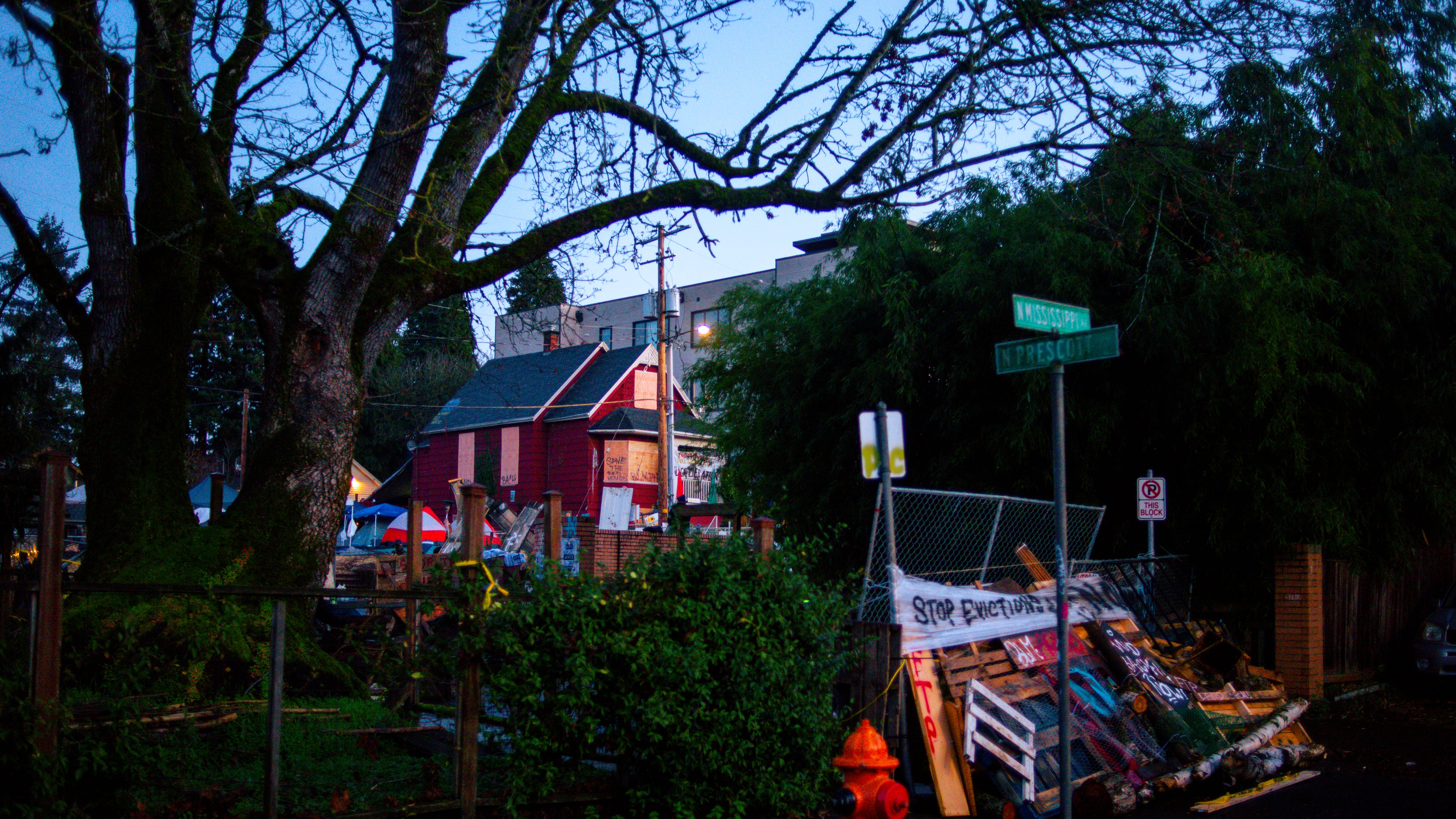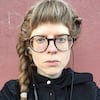8:56 pm Dec. 8, North Mississippi Avenue and Skidmore Street
A group of guards watch the entrance to a barricaded section of road in North Portland. They're armed, masked, and dressed in black—from their balaclavas to their boots to their bulletproof vests. It's intimidating, but they're also laughing with each other, which gives the barricade a feeling similar to entering a nightclub. Can you walk in or will the bouncer tell you to scram?
It's actually a site of protest and siege: what the guards will later name the Red House Eviction Defense, or RHED. It takes the shape of a series of street obstructions that cut off three blocks of road from regular car and foot traffic. At the center of the blockades stands the Kinney family home—known as the "Red House on Mississippi"—home to a Black Afro-Indigenous family for three generations.
For six days, the activists guarding the gates have defied City Hall, chased off police, and captured national attention by occupying these blocks in a campaign to defend the three-bedroom house from seizure due to foreclosure.
They argue the foreclosure resulted from confusing, predatory lending practices and is the latest case of racist gentrification in the historically Black neighborhood of Albina. They also entered a fraught Kinney family legal saga that included reports of animal abuse on the property and the eldest son's assertion that he is a "sovereign citizen" outside the reach of the U.S. court system.
The eviction defense was a remarkable escalation in activist tactics—the seizing of a residential neighborhood by an armed resistance to the legal system. By Dec. 13, it appeared to have worked: The Kinney family raised enough money to buy back the house, and Mayor Ted Wheeler brokered a deal to remove the barricades.

For five nights, Portland's attention was fixed on this intersection. It was easy enough to walk through, but the armed guards deterred many. On any given night there were between 100 and 200 people inside the campground. We were two of them.
On this night, the blockade is brand new. Mississippi is blocked at its intersection with North Skidmore by tall, improvised fences of wood, furniture and scrap metal. Farther in, similar structures stand, suggesting fortifications for tactical retreat. Czech hedgehogs (six-armed metal posts that are difficult to drive over) and spike strips (planks with nails sticking through them) lie scattered across the asphalt to impede barricade-busting vehicles. There are more blockades to the east and to the west, one block out on either side, with checkpoints at every entry.
It looks like the border of a small nation. But a volunteer who goes by "Ranch" is hopeful people will see RHED in a hospitable light. "This place was founded on a spirit of welcoming and generosity," he says.

5:38 am Dec. 9, North Albina Avenue and Prescott Street
Expecting a morning raid by Portland police, a small crowd begins to gather before dawn by an inner barricade. Most of the activists are still asleep, many on miscellaneous mattresses close to the barricades.
Some of the awake activists are making coffee, surrounded by helmeted members of Portland's independent press, who have covered protests for months. A figure in black approaches the press. "If you don't want your camera smashed, you should leave," he says.
Moments later, a water bottle flies over the barricade, slamming into one journalist's backpack. Another bottle follows but misses.
A groggy-looking foursome, also in black clothing, approaches the press group. They begin explaining privacy guidelines they want the press to follow.
"No faces. No photos. No interviews. No requests for interviews," one says.
"Uh, could you get that guy to stop chucking water bottles at us?" one reporter asks.
"Oh yeah, that shouldn't be happening," the groggy volunteer says, waving for another person to check it out. "We'll talk to him."

Behind the fences, piles of stones and glass bottles lie ready, anticipating some sort of medieval war. There's also an onion.
"You can take a photo of that," a less dogmatic activist says to a journalist lying in the road to take pictures. "But don't post it to social media."

3:12 am Dec. 12, food truck at North Albina and Prescott
At the east entrance to the RHED, a medic shows off a recently acquired, gas-powered heat lamp with goofy glee. Once it's actually attached to a small propane tank, the lamp begins to glow with pleasant warmth. The temperature will drop to 34 degrees this morning.
The entrance, which resembles a middle ground between a checkpoint and an outdoor campground, contains semi-organized piles of useful items. Boxes of tin foil and paper plates are used at a nearby food cart called Riot Kitchen. Its sign advertises "Warm, vegan food for all (except cops)."
The truck serves primarily vegetarian and vegan food, but also cooks up ribs—in keeping with the tradition of Riot Ribs, the donations-only barbecue stand associated with the downtown Justice Center protests this summer. Ribs are served in batches, in the midevening and late-night "antifa time."
There's vegetable soup, Cajun rice and a truly outstanding succotash. Hungry diners stand around talking and taking bites, juggling flimsy paper plates. A Riot Kitchen staffer suggests that while all the sides are perfectly good on their own, the secret is to just dump everything into the soup and eat it that way.

One block north, a group of lookouts stand guard in the cold, silhouetted in front of a small bonfire they set in a cast-iron fire pit to keep warm. One carries a rifle and another a paintball gun.
"Just one chud who threw an egg tonight," one of them says. "Not much else, but I'm sure they'll be back."
Since the blockade began, occupiers have been visited nightly by vehicles with hostile occupants. The incidents range from insults to drive-by hurling of fireworks and other incendiary devices. The harassers don't leave their cars—but activists assume they are right-wing counterprotesters, or "chuds." The wee hours of the morning are nicknamed "chud o'clock."
Suddenly, there's a shout of "Get cover! Get cover! Get cover!"
And they all scatter to their many hiding places and battle stations. But it turns out to be a false alarm. A gray sedan idles innocently. "Does anyone know where Portland Avenue is?" the driver asks.

6:02 am Dec. 12, North Albina at Blandena Street
After a long night of guard duty, occupiers excitedly line up to buy coffee from the nearby corner cafe, Albina Press.
The door opens. "Oh, thank God," one black-clad youth says. A friend replies, "Yeah, I've been waiting to use the bathroom forever!"
A cafe worker sticks a rubber stopper under the front door to keep it open—to create airflow as a COVID precaution—then returns a moment later holding a cardboard box with 12 coffees inside.
Throughout the week, various neighbors have purchased coffee for the activists. On one occasion, an older man walked in and gestured somewhat grandly to the people outside. "I want to buy a round of coffees for these fine people," he said.
If the closure of a major city street caused any neighborhood resentment, it hasn't been apparent. In fact, neighbors seem supportive of the movement: A few nearby residents proudly pointed out pieces of wood they brought to be used in the barricades. Another couple invited activists up to their balcony to take photos.
When asked, the cafe worker says a lot of people buy the protesters coffee. "It's happened a number of times," he adds.

As dawn breaks, the RHED feels like a woodland campground. Some are sleeping. Some are stirring. There are over 30 tents, more if you count the waterproof canopies that popped up when it began to rain. Now there's a thoroughfare of covered area keeping clothing donations, food and medical supplies dry—the interior of which feels like a street bazaar, but everything is free.
A call goes up: "Mic check!" And the crowd responds: "Mic check!" As it has since the Occupy Portland camps a decade ago, the call-and-response signals an announcement.
"Yesterday we built stairs!" an organizer says through a megaphone. "Today let's build a ramp to improve accessibility."
They want everyone to be able to reach the top of the hill, where there's a large, brick fire pit. "It's a place for BIPOC people," an entrance guard explains. "It's a place where BIPOC can relax and finally be themselves."
The implication is that it requires several physical barricades of protection and layers of guards—in the middle of an occupied campground that is itself under constant threat of raid by local law enforcement—to make people of color feel safe standing around a fire pit.

6:56 pm Dec. 13, North Albina at Prescott
If the RHED at dawn is like a campground, at night it's like a food pantry. Donations fill the tents until activists say they can't take any more. Stacks of bottled water and a large pile of packaged toilet paper sit in piles marked "Stuff 2 go 2 houseless camps."
There's food at almost every entrance. Each checkpoint has a rain cover and improvised fire pits in metal drums. People sit in camper chairs and on spray-painted couches, talking about politics sometimes but also breakups and TV shows. Almost everyone has a story about physical injuries related to being arrested at protests over the summer.
After dinner, the RHED holds a dance party on Albina where some 20 people confidently dance and another 30 stand around and think about dancing. They dance to the musical taste preferences of artist and activist Creme Brulee: Rihanna, Frank Ocean, Kreayshawn.
The DJ set pauses and local activist Ragina Rage—who's long been associated with the Red House and says she's spent a portion of this year living in the small campground beside it—speaks to the crowd, reminding them all that if they're cold tonight they might want to consider what it's like for people who can't go home. Rage celebrates the recent crowdfunding success: over $300,000 to help the Kinney family buy their home back at cost.
The next morning, the occupiers will agree to dismantle the barricades.
"Even if we get this house back, there're so many other families," Rage says. "The eviction moratorium is almost up. There are so many other families. If they need help, we'll be there. And y'all better show up."



